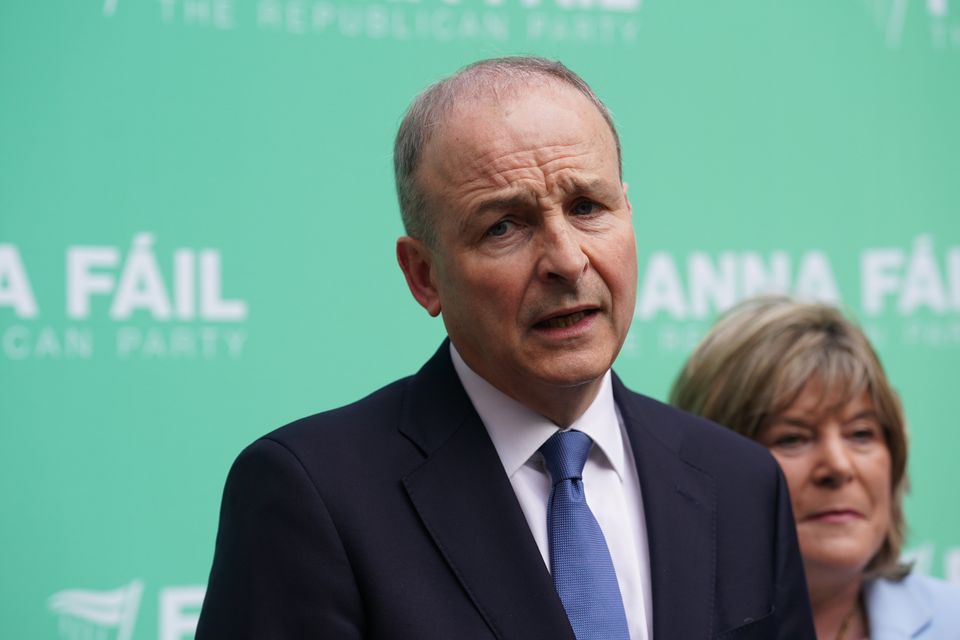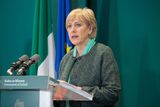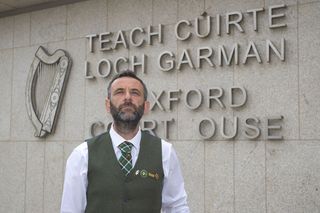Tánaiste pushing for €10 child benefit increase, pension hike and more energy credits in budget; also wants June referendum delayed
Micheál Martin set out a range of measures that would benefit parents, householders and pensionersMr Martin said he wants the June referendum delayed Tánaiste also takes swipe at Lisa Chambers voting No in the family and care referendums despite campaigning for Yes votes
Tánaiste Micheál Martin at the Fianna Fail ard fheis (Brian Lawless/PA)
The Tánaiste said he wants to see a €10 increase in child benefit as well as a pension increase and another round of winter energy credits in the next budget.
Micheál Martin set out a range of measures he wants brought in that would benefit parents, householders and pensioners.
The Fianna Fail leader wants to increase the rate of child benefit, which is currently €140 per child every month.
He is also seeking a €12 increase in the state pension, and said the Government will consider another round of energy credits in this year’s budget, but said it would not be “in the same order” as the last payment.
He made the comments hours after his keynote speech brought an end to the Fianna Fáil ard fheis in Dublin.
Mr Martin denied the potential giveaways are an attempt to throw money at the electorate ahead of a general election.
“I think given how well we manage the public finances and the economy, I think it’s legitimate to signal to people where we intend to go in the next budget, but also where we tend to go for the next five years,” Mr Martin told RTÉ’s The Week in Politics.
“We’re also putting huge amounts of money aside in the Future Ireland Fund, and also in the Infrastructure and Climate Fund. These funds will provide for generations in terms of pensions, health-care costs as we’re living longer, and so forth.
“Also in terms of infrastructure, that we will avoid the stop start nature of infrastructure spending that we’ve had historically.”
He also indicated he would support a proposal to postpone the upcoming patent referendum.
The referendum was to be held in June on the same day as the local and European elections.
“I support obviously, a referendum on patent and but I think we need to do it separately from elections. That would be my preference,” the Tánaiste said.
“I think given the timelines now to the local elections and the European elections and the mayoral election in Limerick, I think it could potentially be very difficult to explain to people and to promote a referendum of that kind in the midst of all the other elections that are going on,” he continued.
The Unified Patent Court, which is in place since last year and has 17 EU members, makes it easier for businesses and inventors to prevent their ideas from being copied across the EU.
The Irish Independent reported on Friday that the referendum on the court is now “under review” after the crushing defeat in the family and care referendum.
While no formal decision has been taken on the vote, Tánaiste and Minister for Foreign Affairs Micheál Martin said the timeline as well as the other elections would make it difficult to explain the referendum.
Aside from the difficulties in explaining the referendum, the Tánaiste said it would also be challenging for voters.
“I was in Limerick last week with Dee Ryan our mayor candidate, and Cynthia Ní Mhurchú, and I went up to a coffee table and I handed the European leaflet, I handed the local election leaflet for a councillor that was there and I handed the mayor leaflet,” Mr Martin said.
“And if I add a fourth leaflet with a referendum, you begin to see how challenging it becomes for the electorate."
The Tánaiste denied postponing the referendum was as a U-turn, saying it is his belief referendums should be held on their own and should not be rushed.
“We're deferring it, we're suggesting that we defer it; the leaders will meet tomorrow evening. And I think that makes sense, because the electoral commission will want time as well.”
Asked if he was surprised to hear that Fianna Fáil TDs, notably the party’s European candidate Lisa Chambers, had campaigned for Yes votes in the last referendums but then voted No, Mr Martin said trust in politics is important.
“Personally, I think people should be upfront about their positions on this,” Mr Martin said.
“It's not the way I would do business, quite frankly, and I think trust is important in politics,” he added.
On whether he believed that voters in the European election could trust Ms Chambers again after the referendum, Mr Martin said these elections were “of a different order”.
“In fairness, I think Lisa Chambers has explained her position; she said she changed her mind in respect of it,” Mr Martin said.
“In terms of the elections to the European Parliament, it's of a different order. In terms of people's contribution there and people's capacity to perform in the European Parliament and people will judge on that,” he said.
Join the Irish Independent WhatsApp channel
Stay up to date with all the latest news















